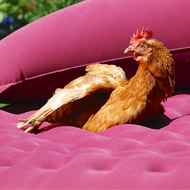
2017 PFMA report reveals state of the pet nation
Chickens are the sixth most popular pet in the UK, according to a recent study.
The Pet Food Manufacturer’s Association’s Pet Data Report 2017 found that some 600,000 households now keep domestic fowl, putting them above guinea pigs, hamsters and lizards.
Commenting, Jane Howorth of the British Hen Welfare Trust, said: “I’m not surprised that chickens are moving up the ranking of most popular pets in the UK, here at the charity we all know what wonderful pets our ex-commercial hens in particular make.
“Each has their own personality and charm; they are quite simply life-enhancing, and what other pet will lay eggs for your breakfast?! Best of all you don’t have to choose between owning a cat/dog and a chicken. Hens will live in perfect harmony with the rest of your furry friends.”
Since 2008, the PFMA Pet Data Report has been tracking the state of the UK’s pet population. Gathered annually during late January and early February, the data is used by government departments, pet care businesses and wildlife charities to inform welfare strategies.
This year’s report reveals that 12 million households in the UK have a pet, with the majority owning a cat (8 million ) or dog (8.5 million). Of the households asked, 28 per cent said they had or would consider owning a small mammal as a first pet.
The survey also reveals that the UK pet food market experienced slight growth in 2016 and is now worth a record £2.6bn. Eighty-eight per cent of owners said that they feed their pet a commercially prepared per food. However, 53 per cent of dog owners who feed table scraps do so daily - as do 43 per cent of cat owners.
"PFMA has a very specific role in the area of pet nutirition and this is where we educate to make sure those at the front line of pet care have all the information they need to support pet owners in providing the best possible diets for their pets," explained Nicole Paley, PFMA communications manager.
"The educational work of PFMA and the other organisations is ongoing and what is particularly unique about the pet care sector is how well those organisations come together to bring about change. PFMA look forward to this continued collaboration and achieving real results for our amazing companion animals in 2017 and beyond".



 FIVP has shared a survey, inviting those working in independent practice to share their views on the CMA's proposed remedies.
FIVP has shared a survey, inviting those working in independent practice to share their views on the CMA's proposed remedies.